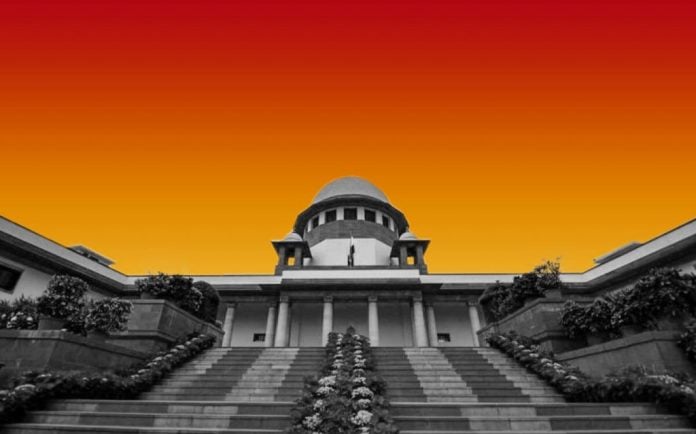The Supreme Court on Thursday refused to entertain on judicial side a petition filed by the Supreme Court Bar Association (SCBA), seeking conversion of land measuring 1.33 acres, which was allotted to the Apex Court by the Central government, into chamber blocks for lawyers.
The Bench of Chief Justice of India D.Y. Chandrachud, Justice S.K. Kaul and Justice P.S. Narasimha observed that SCBA cannot assert a right over the entirety of the 1.33 acres of land allotted to the Supreme Court for conversion into lawyers chambers.
Noting that the space was allotted to the Supreme Court by the Union government for various purposes including the housing of archives, the Bench observed that it has to balance the needs of various stakeholders, including lawyers and litigants, for both the present and the future.
Reading out the operative part of the verdict, CJI Chandrachud said that such matters could not be resolved by the application of judicial standards and that it would be open for this Court to take take an appropriate decision on the administrative side, after consulting all stakeholders.
The plea had further sought conversion of the entire area around the Supreme Court into a ‘Supreme Court Block,’ in order to utilise all buildings across the Supreme Court on Bhagwandas Road for conversion into lawyers chambers. It further sought allotment of the building occupied by the Foreign Correspondents Club for the occupation of the association.
While refusing to entertain these prayers, the Apex Court granted liberty to the SCBA, the Supreme Court Advocates-on-Record Association (SCAoRA) and the Bar Council of India (BCI) to make representations on the issue.
Earlier on March 17, the Bench of Chief Justice of India (CJI) D.Y. Chandrachud, Justice S.K. Kaul and Justice P.V. Narasimha had reserved its judgment on the petition, saying that it would take some time to deliberate on the issue.
The top court of the country had observed then also that the issue should be taken up with the government on the administrative side.
The CJI said the lawyers were a part of the institution. The Apex Court using its judicial orders for its expansion may not send the correct message. Today, it was about land, tomorrow it may be something else, he added.
If the matter was put across administratively, the government would definitely look into it, noted Justice Chandrachud, adding that this has been the old tradition of the judiciary in the country.
He said the CJI, who represented the institution, would engage with the government, saying that its needs for the future were expanding. The government would definitely engage with the judiciary on the administrative side.
He said for example, the government allotted Rs 7000 crore for the E-courts project, understanding the need of the Apex Court.
However, the suggestion did not go down well with the SCBA President, who said that the Bar and other stakeholders would not be a part of such administrative consultation.
As per Singh, the Delhi High Court had taken over some land for its expansion and urged the Apex Court to adopt a similar approach.
Justice Kaul responded by saying that the expansion was done based on an administrative decision by the government.
Singh then informed the bench that even if they got the whole land, they would only get 600 chambers, whereas about 1500 lawyers were in the waiting list.
During the hearing, the Supreme Court Advocates on Record Association (SCAORA) sought to be a part of the proceedings, stating that several AORs also needed the chambers.
Appearing for the body, Senior Advocate Meenakshi Arora contended that the AORs itself represented a body, which was very integral to the judiciary. Stating that 800 AORs were entitled for chambers, she said the AORs needed to have chambers within six kms of the Apex Court.
The Bar Council of India also sought impleadment in the case, stating that the Council had no place to accommodate the lawyers, who had to wait under the Sun and in the rains. Speaking about the legal education programme, he said the training had to be taken up at home since there was no place for such events or seminars. The SCBA opposed the BCI’s request.
The CJI sought opinion of Attorney General R. Venkataramani over the matter. The AG, while expressing that the flexibility of the administrative side would be beneficial, said that on the judicial side, he may lose the capacity to be a neutral mediator.


